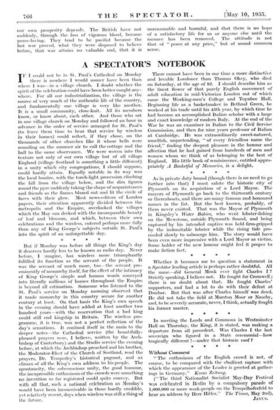A SPECTATOR'S NOTEBOOK
IF I could not be in St. Paul's Cathedral on Monday there is nowhere I would sooner have been than where I was—in a village church. I doubt -whether -the spirit of the celebration could have been better caught any- where. For all our industrialization, the village is the source of very much of the authentic life of the country, and fundamentally one village is very like another-. It is a small community, close-knit. All its members know, or know about, each other. And those who sat in one village church on Monday and followed an hour in advance in the order of service arranged for St. Paul's (to leave them time to • hear that service by wireless in their homes) could reflect, if they chose, on the thousands of other churches like it whose bells were sounding on the summer air to call the cottage and the hall to the same observance. We were woven into the texture not only of our own village but of all village England (village Scotland is something a little different) in a unity which city congregations, I should suppose, could hardly attain. Equally notable in its way was the local bonfire, with the torch-light procession climbing the hill from the village below, and the dim figures round the pyre suddenly taking the shape of acquaintances and friends as the flames blazed out and lit the circle of faces with their glow. Most news-editors of London papers, their attention apparently divided between the metropolis and the Empire, overlooked the villages which the May sun decked with the incomparable beauty of leaf and blossom, and which, between their own celebrations and the wireless, entered perhaps more fully than any of King George's subjects outside St. Paul's into the spirit of an unforgettable day.
* *


































































 Previous page
Previous page